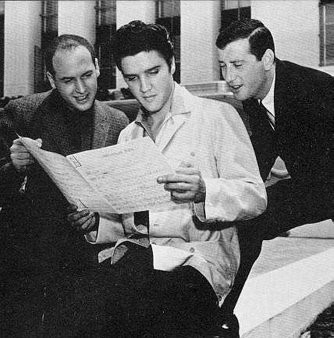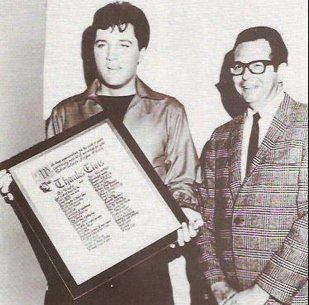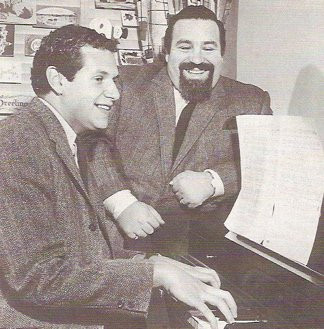Are you curious about Who Wrote Elvis Songs and helped shape the King’s legendary career? At payoffsong.com, we unveil the masterminds behind Elvis Presley’s iconic hits, exploring how their songwriting brilliance contributed to his enduring success and the potential for lucrative opportunities in music licensing. Discover the stories behind the songs and explore the opportunities for music licensing and copyright monetization on payoffsong.com, where creativity meets commerce.
1. What Factors Defined Elvis’s Hit Songwriters?
To identify the top hit songwriters for Elvis Presley, certain criteria must be considered. A song was deemed eligible if Elvis’s recording reached the top 25 of Billboard’s Top or Hot 100 chart. This objective benchmark ensures that only the most successful and impactful songs are included. Points were assigned to songwriters based on the peak chart position of Elvis’s version of their song, ranging from 25 points for a #1 hit to 1 point for a #25 hit. This system provides a quantitative measure of each songwriter’s contribution to Elvis’s chart success.
1.1. Why Focus on Billboard Chart Performance?
Billboard chart performance serves as an objective measure of a song’s popularity and commercial success. According to Billboard, the Hot 100 chart reflects the most popular songs in the United States based on sales, streaming, and radio airplay. Focusing on songs that reached the top 25 ensures that only the most impactful and widely recognized compositions are considered, providing a clear and consistent standard for evaluating songwriters’ contributions.
1.2. How Were Points Assigned to Songwriters?
Points were assigned to songwriters based on the peak chart position of Elvis’s version of their song. A song that reached #1 earned 25 points, #2 earned 24 points, and so on, down to #25, which earned 1 point. This point system provides a quantifiable way to rank songwriters based on the commercial success of their collaborations with Elvis Presley, as measured by their performance on the Billboard charts.
2. Who Are the Top 10 Hit Songwriters of Elvis Presley?
Based on the criteria outlined above, here are the top 10 “hit” songwriters in Elvis Presley’s career:
- Jerry Leiber and Mike Stoller (133 points)
- Aaron Schroeder (122 points)
- Otis Blackwell (104 points)
- Doc Pomus (89 points)
- Mort Shuman (68 points)
- Winfield Scott (54 points)
- Wally Gold (50 points)
- Mac Davis (43 points)
- Ben Weisman (40 points)
- Florence Kaye (40 points)
2.1. How Did Leiber and Stoller Dominate Elvis’s Songwriting?
Jerry Leiber and Mike Stoller, inducted into both the Songwriters Hall of Fame and the Rock and Roll Hall of Fame, are arguably the most influential American songwriters and record producers in post-World War II popular music. By the time Elvis came along, they were already successful R&B songwriters with hits such as “Kansas City” and “Hound Dog.” Elvis’s recording and controversial TV performances of “Hound Dog” tied the composers and the singer together, cementing their place in music history.
2.1.1. What Songs Did Leiber and Stoller Write for Elvis?
Elvis eventually recorded 23 Leiber-Stoller compositions. Six of them, starting with “Hound Dog” (#2) and “Love Me” (#6) in 1956, reached the top 10 on Billboard’s pop chart. “Jailhouse Rock” and “Don’t” both topped the chart in 1957. “She’s Not You” (#5) was a rare collaboration with Doc Pomus. Finally, in 1963 Elvis took Leiber and Stoller’s “Bossa Nova Baby” to #8 on the chart. These hits showcased their versatility and ability to craft songs that resonated with Elvis’s unique style and audience.
2.2. What Made Aaron Schroeder Such a Prolific Elvis Songwriter?
Aaron Schroeder, writing with various partners, helped compose 16 songs recorded by Elvis Presley. According to the Songwriters Hall of Fame, Schroeder penned four of Elvis’s #1 records, more than any other composer or team. His ability to create catchy melodies and relatable lyrics made him a sought-after collaborator for Elvis.
2.2.1. Which #1 Hits Did Schroeder Co-Write for Elvis?
Schroeder co-wrote the chart-toppers “It’s Now or Never” and “Good Luck Charm” with Wally Gold, “Big Hunk O’ Love” with Sid Wyche, and “Stuck on You” with J. Leslie McFarland. In addition, Schroeder also wrote (with David Hill) Elvis’s “I Got Stung” (#8). His diverse collaborations and consistent output of hit songs solidified his place as a top songwriter for Elvis.
2.3. How Did Otis Blackwell Redefine American Popular Music?
Otis Blackwell is best known for writing some of Elvis’s smash hits. According to Wikipedia, Blackwell is one of the select songwriters whose songs literally helped redefine American popular music in the early and mid-1950s. His more than 1,000 songs have sold nearly 200 million records, making him a true icon in the music industry.
2.3.1. What Were Blackwell’s Biggest Hits for Elvis?
Of the 10 Blackwell compositions that Elvis recorded, half were top 25 hits. When Elvis recorded “Don’t Be Cruel” in 1956, Blackwell agreed to give Presley credit as co-writer, even though Elvis had no input on the tune. The recording spent 7 weeks at #1. Blackwell also penned “All Shook Up,” the biggest hit in Elvis’s career, which spent 30 weeks on the Top 100, including 8 weeks at #1. He also teamed with Winfield Scott to write later Presley hits “Return to Sender,” “One Broken Heart for Sale,” and “Such an Easy Question.”
2.4. How Did Doc Pomus and Mort Shuman Collaborate to Create Elvis Classics?
Doc Pomus and Mort Shuman teamed up to compose many hit songs in the 1960s. Pomus provided the lyrics for Shuman’s melodies, although occasionally they worked on both together. Their collaboration resulted in numerous hit songs, including several that became Elvis classics.
2.4.1. What Elvis Songs Did Pomus and Shuman Co-Write?
While “Viva Las Vegas” didn’t chart in the top 25, three other Pomus-Shuman songs reached the top 5: “Surrender” (#1), “Little Sister” (#5), and “His Latest Flame” (#4). These songs demonstrated their ability to craft catchy and memorable tunes that perfectly suited Elvis’s vocal style.
2.5. Why Is Winfield Scott Remembered for His Elvis Contributions?
Elvis recorded less than 10 songs written by Winfield Scott, but three of them, all co-written with Otis Blackwell, finished well up on Billboard’s pop chart. These hits, including “Return to Sender,” “One Broken Heart for Sale,” and “Such an Easy Question,” solidified Scott’s place in Elvis’s songwriting history.
2.5.1. What Other Elvis Songs Did Scott Contribute To?
Among his other songs recorded by Elvis were “Stranger in the Crowd” and “Long Legged Girl (With the Short Dress On.)” Scott’s contributions, though fewer in number, were significant in shaping Elvis’s sound during a pivotal period in his career.
2.6. How Did Wally Gold Transition from Music to Travel?
Wally Gold earns a place on the list based on just two Elvis songs he co-wrote with Aaron Schroeder: “It’s Now or Never” and “Good Luck Charm,” both #1 hits for Elvis. Gold also co-wrote several other memorable sixties pop hits, including “It’s My Party” for Leslie Gore and “Half Heaven-Half Heartache” for Gene Pitney. After leaving the music business, Gold worked as a travel agent until his death in 1998.
2.7. Why Is Mac Davis Considered a Key Songwriter in Elvis’s Career Resurgence?
The Texas singer-songwriter only wrote a handful of songs for Elvis. However, they came at a critical time, when Elvis was reshaping his career in the late 1960s. Neither “A Little Less Conversation” nor “Memories,” both co-written with Billy Strange, reached the top 25, but Davis is #8 on the Elvis composer list on the strength of two top 10 Elvis hits he wrote on his own: “In the Ghetto” (#3) and “Don’t Cry Daddy” (#6). Davis went on to have a very successful career as a country singer in the 1970s and 1980s.
2.8. What Was Ben Weisman’s Nickname Given by Elvis?
Rhode Island native Ben Weisman, co-writer of over 50 of Elvis’s songs in the ’60s, finished in a tie with Florence Kaye on the list. Although Weisman penned five Presley top 25 songs, he is lower on the list because none of them reached the top 10. They were: “Fame and Fortune” (#17), “Rock-a-Hula Baby” (#23), “Follow That Dream” (#15), “Do the Clam” (#21), and “Frankie and Johnny” (#14). According to Wikipedia, Elvis’s nickname for the demure-looking Weisman was “the mad professor.”
2.9. Who Was the Only Female Composer on the Top 10 List?
The only female composer on the list, New York City-born Florence Kaye usually wrote as part of a team with Bill Giant and Bernie Baum. Together they composed over 40 songs for Elvis, most of which were used in 14 of his movies. However, the trio also composed two non-movie top 25 hits for Elvis—”Devil in Disguise” (#3) and “Ask Me” (#12). Florence, however, finishes alone above Giant and Baum on the list because she gets credit for “Rock-a-Hula Baby” (#23), which she wrote with Ben Wiseman and Fred Wise. Florence Kaye passed away in 2006.

Jerry Leiber and Mike Stoller stand as pivotal figures in shaping Elvis Presley’s musical journey, contributing significantly to his enduring legacy.
3. Who Were Some Notable Runners-Up in Elvis’s Songwriting History?
Several other songwriters made significant contributions to Elvis’s music catalog but narrowly missed the top 10 list. These runners-up include Sid Wayne, Fred Wise, and the tandem of Bill Giant and Bernie Baum.
3.1. How Did Sid Wayne Contribute to Elvis’s Hit Songs?
Sid Wayne had a hand in Presley hits “I Need Your Love Tonight” (#4), “Flaming Star” (#14), and “Do the Clam” (#21). His versatility and ability to write across different genres made him a valuable contributor to Elvis’s diverse musical output.
3.2. What Songs Did Fred Wise Help Write for Elvis?
Wise helped write “Fame and Fortune” (#17), “Rock-a-Hula Baby” (#23), “Follow That Dream” (#15), and “Kissin’ Cousins” (#12). Wise’s songs often featured catchy melodies and relatable lyrics, making them popular choices for Elvis to record.
3.3. What Was the Collaboration Between Giant, Baum, and Kaye Known For?
Giant and Baum wrote “Devil in Disguise” (#3) and “Ask Me” (#12) with Florence Kaye. Their collaborative efforts produced some of Elvis’s most memorable and commercially successful songs.
3.4. Why Didn’t Tepper and Bennett Make the Top 10 Despite Writing Many Songs for Elvis?
Sid Tepper and Roy C. Bennett wrote over 40 songs for Elvis, most of which were used in his movies. However, they didn’t make this Top 10 list because only one Bennett-Tepper tune reached the top 25 on the pop charts, that being “Puppet on a String” (#14) in 1965. This highlights the importance of chart performance in determining the most impactful songwriters in Elvis’s career.

Ben Weisman, nicknamed “the mad professor” by Elvis, penned over 50 songs for the King, significantly contributing to his extensive discography.
4. How Did Elvis’s Songwriters Adapt to Different Musical Styles?
Elvis Presley was known for his ability to adapt to various musical styles, and his songwriters played a crucial role in this versatility. They were able to craft songs that spanned genres such as rock and roll, rhythm and blues, country, and pop, allowing Elvis to appeal to a broad audience.
4.1. How Did Leiber and Stoller Blend R&B with Elvis’s Style?
Leiber and Stoller were already successful R&B songwriters before working with Elvis. They seamlessly blended their R&B roots with Elvis’s rock and roll style, creating a unique and infectious sound that helped define his early career.
4.2. How Did Mac Davis Infuse Country Elements Into Elvis’s Music?
Mac Davis, a successful country singer in his own right, brought a country sensibility to Elvis’s music during a time when Elvis was looking to reshape his career. Songs like “In the Ghetto” and “Don’t Cry Daddy” showcased Davis’s ability to write heartfelt and emotionally resonant lyrics that resonated with Elvis’s audience.
4.3. How Did the Brill Building Songwriters Contribute to Elvis’s Pop Appeal?
Many of Elvis’s songwriters, such as Doc Pomus and Mort Shuman, came from the Brill Building in New York City, a hub of pop songwriting in the 1960s. These songwriters specialized in crafting catchy and commercially viable songs that helped Elvis maintain his pop appeal throughout his career.
5. How Can Songwriters and Music Professionals Benefit from Understanding Elvis’s Songwriting Success?
Understanding the factors that contributed to Elvis Presley’s songwriting success can provide valuable insights for songwriters, music publishers, and other music industry professionals. By studying the techniques and strategies employed by Elvis’s hit songwriters, aspiring musicians can improve their own craft and increase their chances of achieving commercial success.
5.1. What Can Songwriters Learn From Leiber and Stoller’s Collaboration?
The collaboration between Jerry Leiber and Mike Stoller demonstrates the power of teamwork and the importance of complementing each other’s strengths. Songwriters can learn from their ability to seamlessly blend lyrics and music to create timeless hits.
5.2. How Can Aspiring Songwriters Emulate Aaron Schroeder’s Work Ethic?
Aaron Schroeder’s prolific output and consistent ability to write hit songs demonstrate the importance of hard work and dedication. Aspiring songwriters can emulate his work ethic by writing regularly, seeking out collaborations, and constantly honing their craft.
5.3. What Can Music Publishers Learn From Elvis’s Songwriting Choices?
Music publishers can learn from Elvis’s ability to identify and record songs that resonated with a broad audience. By studying his songwriting choices, publishers can gain insights into what types of songs have the potential to become commercial hits.
5.4. How Can Payoffsong.com Help Songwriters and Music Professionals?
Payoffsong.com provides a platform for songwriters and music professionals to connect, collaborate, and monetize their music. By offering resources such as music licensing opportunities, copyright management tools, and industry insights, payoffsong.com helps musicians navigate the complex world of music publishing and maximize their earning potential.
Address: 1601 Vine St, Los Angeles, CA 90028, United States
Phone: +1 (323) 469-2211
Website: payoffsong.com

Wally Gold, alongside Aaron Schroeder, crafted iconic hits like “It’s Now or Never” for Elvis, showcasing their exceptional songwriting prowess.
6. What Is the Role of Music Licensing in Preserving and Promoting Elvis’s Songwriting Legacy?
Music licensing plays a crucial role in preserving and promoting Elvis Presley’s songwriting legacy. By licensing his songs for use in films, television shows, commercials, and other media, music publishers ensure that his music continues to reach new audiences and generate revenue for his estate.
6.1. How Does Music Licensing Benefit Songwriters and Their Estates?
Music licensing provides songwriters and their estates with a steady stream of income through royalties. These royalties can help support their families and ensure that their music continues to be heard and appreciated for generations to come.
6.2. How Can Music Supervisors Find and License Elvis’s Songs?
Music supervisors can find and license Elvis’s songs through music publishers, licensing agencies, and online music licensing platforms like payoffsong.com. These resources provide access to a vast catalog of songs and simplify the process of obtaining the necessary licenses.
6.3. What Are the Different Types of Music Licenses Available for Elvis’s Songs?
There are several types of music licenses available for Elvis’s songs, including synchronization licenses (for use in films and television shows), mechanical licenses (for reproduction on CDs and vinyl records), performance licenses (for public performances), and master use licenses (for use of the original recording). Understanding the different types of licenses is essential for music supervisors and other professionals who want to use Elvis’s music in their projects.
7. How Did Elvis’s Early Musical Influences Shape His Song Selection and Interpretation?
Elvis Presley’s unique ability to interpret songs and inject his own brand of emotion, energy, and feeling into them was a key factor in his success. His early musical influences, which included gospel, blues, and country music, shaped his song selection and interpretation, allowing him to connect with audiences on a deep and personal level.
7.1. How Did Gospel Music Influence Elvis’s Vocal Style?
Elvis grew up singing gospel music in church, and this influence is evident in his powerful and emotive vocal style. His gospel background gave him a unique ability to convey deep emotion and spiritual conviction through his singing.
7.2. How Did Blues Music Shape Elvis’s Rhythmic Sensibilities?
Elvis was heavily influenced by blues music, which shaped his rhythmic sensibilities and gave him a unique sense of groove. His ability to blend blues elements with rock and roll created a distinctive and infectious sound that captivated audiences.
7.3. How Did Country Music Contribute to Elvis’s Storytelling Abilities?
Elvis was also influenced by country music, which contributed to his storytelling abilities and gave him a knack for interpreting songs with relatable and emotionally resonant lyrics. His country background helped him connect with audiences on a personal level and convey a sense of authenticity in his performances.

Doc Pomus and Mort Shuman, a dynamic songwriting duo, penned numerous hits for Elvis, leaving an indelible mark on his musical repertoire.
8. What Role Did Elvis Play in Popularizing the Songs Written for Him?
While Elvis Presley was not a “singer-songwriter,” he had a unique talent for interpreting songs and making them his own. He often took songs written by others and infused them with his own personality and style, transforming them into iconic hits.
8.1. How Did Elvis Transform “Hound Dog” Into a Rock and Roll Anthem?
“Hound Dog” was originally written and performed by blues singer Big Mama Thornton. However, Elvis transformed the song into a rock and roll anthem with his energetic performance and suggestive dance moves. His version of “Hound Dog” became one of the defining songs of his career and helped solidify his status as a rock and roll icon.
8.2. How Did Elvis Elevate “It’s Now or Never” to International Success?
“It’s Now or Never” was based on the Italian song “O Sole Mio.” Elvis took the song and gave it a rock and roll twist, transforming it into an international hit. His version of “It’s Now or Never” topped the charts in multiple countries and remains one of his most popular recordings.
8.3. How Did Elvis’s Interpretation of “In the Ghetto” Impact Social Commentary in Music?
“In the Ghetto” was written by Mac Davis and tells the story of a young boy growing up in poverty. Elvis’s interpretation of the song brought attention to social issues and helped pave the way for more socially conscious music in the years to come.
9. How Does the Legacy of Elvis’s Songwriters Continue to Inspire Musicians Today?
The legacy of Elvis Presley’s songwriters continues to inspire musicians today. Their ability to craft timeless songs that resonate with audiences across generations has made them role models for aspiring songwriters and music industry professionals.
9.1. How Do Modern Songwriters Draw Inspiration From Leiber and Stoller?
Modern songwriters draw inspiration from Leiber and Stoller’s ability to write songs that are both catchy and meaningful. Their use of clever wordplay and relatable themes continues to influence songwriters today.
9.2. How Does Aaron Schroeder’s Work Ethic Influence Aspiring Musicians?
Aaron Schroeder’s prolific output and dedication to his craft serve as an inspiration to aspiring musicians. His example encourages them to work hard, hone their skills, and never give up on their dreams.
9.3. How Does the Brill Building Legacy Impact Contemporary Pop Music?
The Brill Building legacy, which includes many of Elvis’s songwriters, continues to impact contemporary pop music. The Brill Building’s focus on crafting commercially viable songs with catchy melodies and relatable lyrics remains a key influence in the pop music industry today.
10. What Are Some Frequently Asked Questions About Who Wrote Elvis Songs?
Here are some frequently asked questions about who wrote Elvis Presley’s songs:
10.1. Did Elvis Write His Own Songs?
No, Elvis Presley was not primarily a songwriter. He was known for his unique interpretations of songs written by others.
10.2. Who Wrote “Hound Dog” for Elvis?
Jerry Leiber and Mike Stoller wrote “Hound Dog” for Elvis Presley.
10.3. Who Wrote “It’s Now or Never” for Elvis?
Aaron Schroeder and Wally Gold co-wrote “It’s Now or Never” for Elvis Presley.
10.4. Who Wrote “All Shook Up” for Elvis?
Otis Blackwell wrote “All Shook Up” for Elvis Presley.
10.5. Who Wrote “In the Ghetto” for Elvis?
Mac Davis wrote “In the Ghetto” for Elvis Presley.
10.6. How Many Songs Did Leiber and Stoller Write for Elvis?
Jerry Leiber and Mike Stoller wrote 23 songs that Elvis Presley recorded.
10.7. How Many #1 Hits Did Aaron Schroeder Write for Elvis?
Aaron Schroeder co-wrote four #1 hits for Elvis Presley.
10.8. Who Was the Only Female Songwriter on the Top 10 List?
Florence Kaye was the only female songwriter on the top 10 list of Elvis Presley’s hit songwriters.
10.9. Did Elvis Ever Collaborate With the Beatles?
No, Elvis Presley never collaborated with The Beatles.
10.10. Where Can I Find More Information About Elvis’s Songwriters?
You can find more information about Elvis Presley’s songwriters on websites like payoffsong.com, which provide comprehensive resources and insights into the music industry.
Uncover more about the talented individuals behind Elvis’s greatest hits and explore your potential in the world of music licensing by visiting payoffsong.com today. Join our community to discover opportunities, gain insights, and connect with industry experts!

